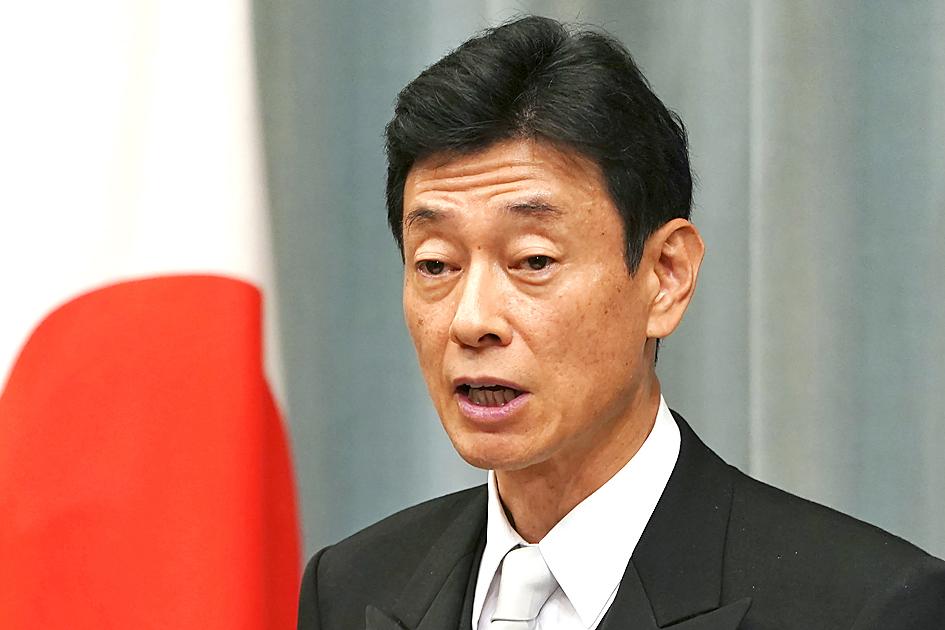Japan yesterday welcomed Taiwan’s application to join a trans-Pacific trade pact, citing shared democratic values.
Japanese officials’ appreciation of Taiwan’s values with regard to democracy and rule of law contrasted with Tokyo’s cautious reaction to China’s bid to join the Comprehensive and Progressive Agreement for Trans-Pacific Partnership (CPTPP).
“We consider Taiwan a very important partner with which we share fundamental values such as freedom, democracy, basic human rights and rule of law,” Japanese Minister for Economic and Fiscal Policy Yasutoshi Nishimura told a news conference.

Photo: AP
Japan is chairing the pact this year.
After Taiwan made the application on Wednesday, the Chinese Ministry of Foreign Affairs said it opposed Taiwan “entering into any official treaty or organization.”
In Taipei, the Ministry of Foreign Affairs said: “The Chinese government only wants to bully Taiwan in the international community, and is the arch criminal in increased hostility across the Taiwan Strait,” it said.
China is not a member of the CPTPP and its trade system has been widely questioned globally for not meeting the high standards of the bloc, it said.
President Tsai Ing-wen (蔡英文) said tech powerhouse Taiwan is well-prepared to join the bloc.
“Joining CPTPP will strengthen Taiwan’s key global strategic and economic and trade status, and further integrate us with the world,” Tsai said in Keelung yesterday.
While Japan said Taiwan’s application would need to be scrutinized against the trade pact’s strict standards, the positive reaction stood in contrast to a cautious response to China’s application on Thursday last week.
Japanese Deputy Prime Minister Taro Aso expressed skepticism about China’s chances, citing strict rules related to state-owned enterprises.
Japanese Chief Cabinet Secretary Katsunobu Kato yesterday sidestepped a reporter’s question about the different reactions to the applications, declining to go into specifics on Japan’s position on China, but referring to values shared with Taiwan.
Kato added that under the trade pact’s rules, membership was open to Taiwan, adding that it was already an independent member of the WTO and APEC.
All four candidates to become Japan’s next prime minister yesterday also expressed uniform support for Taiwan’s bid.
During a debate broadcast online, one of the candidates, former minister of foreign affairs Fumio Kishida, “welcomed” Taiwan’s application, saying Japan and Taiwan share values such as human rights.
Japanese Minister of Administrative Reform and Regulatory Reform Taro Kono also said he supported Taiwan’s participation in the WHO.
“Considering economic exchanges between Japan and Taiwan, I think it is a very happy thing that Taiwan will join after passing TPP’s [Trans-Pacific Pact’s] high standard. Definitely, I would like to support,” Kono said.

ENDEAVOR MANTA: The ship is programmed to automatically return to its designated home port and would self-destruct if seized by another party The Endeavor Manta, Taiwan’s first military-specification uncrewed surface vehicle (USV) tailor-made to operate in the Taiwan Strait in a bid to bolster the nation’s asymmetric combat capabilities made its first appearance at Kaohsiung’s Singda Harbor yesterday. Taking inspiration from Ukraine’s navy, which is using USVs to force Russia’s Black Sea fleet to take shelter within its own ports, CSBC Taiwan (台灣國際造船) established a research and development unit on USVs last year, CSBC chairman Huang Cheng-hung (黃正弘) said. With the exception of the satellite guidance system and the outboard motors — which were purchased from foreign companies that were not affiliated with Chinese-funded

PERMIT REVOKED: The influencer at a news conference said the National Immigration Agency was infringing on human rights and persecuting Chinese spouses Chinese influencer “Yaya in Taiwan” (亞亞在台灣) yesterday evening voluntarily left Taiwan, despite saying yesterday morning that she had “no intention” of leaving after her residence permit was revoked over her comments on Taiwan being “unified” with China by military force. The Ministry of the Interior yesterday had said that it could forcibly deport the influencer at midnight, but was considering taking a more flexible approach and beginning procedures this morning. The influencer, whose given name is Liu Zhenya (劉振亞), departed on a 8:45pm flight from Taipei International Airport (Songshan airport) to Fuzhou, China. Liu held a news conference at the airport at 7pm,

AIR SUPPORT: The Ministry of National Defense thanked the US for the delivery, adding that it was an indicator of the White House’s commitment to the Taiwan Relations Act Deputy Minister of National Defense Po Horng-huei (柏鴻輝) and Representative to the US Alexander Yui on Friday attended a delivery ceremony for the first of Taiwan’s long-awaited 66 F-16C/D Block 70 jets at a Lockheed Martin Corp factory in Greenville, South Carolina. “We are so proud to be the global home of the F-16 and to support Taiwan’s air defense capabilities,” US Representative William Timmons wrote on X, alongside a photograph of Taiwanese and US officials at the event. The F-16C/D Block 70 jets Taiwan ordered have the same capabilities as aircraft that had been upgraded to F-16Vs. The batch of Lockheed Martin

GRIDLOCK: The National Fire Agency’s Special Search and Rescue team is on standby to travel to the countries to help out with the rescue effort A powerful earthquake rocked Myanmar and neighboring Thailand yesterday, killing at least three people in Bangkok and burying dozens when a high-rise building under construction collapsed. Footage shared on social media from Myanmar’s second-largest city showed widespread destruction, raising fears that many were trapped under the rubble or killed. The magnitude 7.7 earthquake, with an epicenter near Mandalay in Myanmar, struck at midday and was followed by a strong magnitude 6.4 aftershock. The extent of death, injury and destruction — especially in Myanmar, which is embroiled in a civil war and where information is tightly controlled at the best of times —